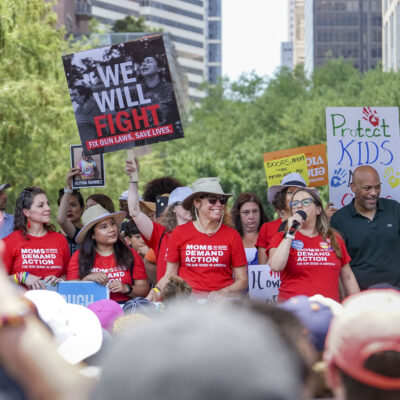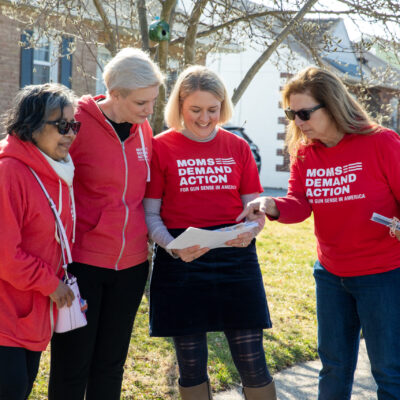Domestic Violence
What is the problem?
Domestic violence and gun violence are deeply interconnected, impacting millions of women, families, and communities across the US. Guns are more likely to turn abuse fatal.
Why is it an issue?
Guns can turn domestic violence deadly.
Abusers use guns to threaten and control victims. These threats often escalate to murder. Hundreds of women are shot and killed by an intimate partner every year,1Everytown Research analysis of Centers for Disease Control and Prevention, National Violent Death Reporting System (NVDRS), Average: 2020–2022. Analysis includes firearm homicides involving an intimate partner and women ages 18–85+. See also, Everytown for Gun Safety Support Fund, “EveryStat: United States,” https://everystat.org/. and nearly 6 million women reported having a gun used on them2While the survey question is up for interpretation by respondents and doesn’t provide further breakdowns, this count likely includes cases of being shot or shot at, hit with, and threats with a firearm. by an intimate partner.34.7 percent of women (5.9 million) in the United States reported having a gun used on them by a current or former intimate partner at some point in their lifetime. Ruth W. Leemis et al., “The National Intimate Partner and Sexual Violence Survey: 2016/2017 Report on Intimate Partner Violence,” Centers for Disease Control and Prevention, October 2022, https://stacks.cdc.gov/view/cdc/124646. The ripple effects of guns in the hands of an abuser extend far beyond the intimate relationship. This affects children, family members, coworkers, and the law enforcement officers who respond to acts of domestic violence. The deadly intersection of guns and domestic violence has a disproportionate impact on Black and American Indian/Alaska Native women.4Everytown Research analysis of Centers for Disease Control and Prevention, National Violent Death Reporting System (NVDRS), Average: 2020–2022. Analysis includes firearm homicides involving an intimate partner and women ages 18–85+. Black and AIAN defined as non-Latinx origin. See also, Everytown for Gun Safety Support Fund, “EveryStat: United States,” https://everystat.org/. Research clearly shows that federal and state policies and practices that disrupt abusers’ access to guns can save lives.5April M. Zeoli et al., “Analysis of the Strength of Legal Firearms Restrictions for Perpetrators of Domestic Violence and Their Associations with Intimate Partner Homicide,” American Journal of Epidemiology 187, no. 11 (November 2018): 2365–71, https://doi.org/10.1093/aje/kwy174; Carolina Diez et al., “State Intimate Partner Violence-Related Firearm Laws and Intimate Partner Homicide Rates in the United States, 1991 to 2015,” Annals of Internal Medicine 167, no. 8 (October 2017): 536–43, https://doi.org/10.7326/M16-2849; April M. Zeoli and Daniel W. Webster, “Effects of Domestic Violence Policies, Alcohol Taxes, and Police Staffing Levels on Intimate Partner Homicide in Large US Cities,” Injury Prevention 16, no. 2 (2010): 90–95, https://injuryprevention.bmj.com/content/16/2/90; Maeve E. Wallace et al., “Firearm Relinquishment Laws Associated with Substantial Reduction in Homicide of Pregnant and Postpartum Women,” Health Affairs 40, no. 10 (2021): 1654–62, https://doi.org/10.1377/hlthaff.2021.01129.
By the numbers
5x
Access to a gun makes it five times more likely that a woman will die at the hands of a domestic abuser.
6M
Nearly 6 million women reported having a gun used on them by an intimate partner.
46%
In nearly half of mass shootings with four or more people killed, the perpetrator shot an intimate partner or family member.
1 in 9
Each year, on average, at least one in nine prohibited gun purchasers denied by a background check are denied due to prohibiting domestic violence histories.
What are the solutions?
-
Background Checks on All Gun Sales
Background checks are the foundation of any comprehensive gun violence prevention strategy. Current federal law requires that background checks be conducted whenever a person attempts to buy a gun from a licensed gun dealer. This is to ensure that the buyer is not legally prohibited from having the gun. Since federal law began requiring these background checks in 1994, background checks have blocked millions of sales to people with felony convictions or other prohibiting histories.
-
Prohibit People With Dangerous Histories From Having Guns
People with dangerous histories must be prohibited from having guns. Federal law prohibits gun possession by certain categories of people. States also set standards for who is too dangerous to have guns. People prohibited by federal or state law will fail a background check if they try to buy a gun from a licensed dealer.
-
Require Prohibited People to Turn in Their Guns
Requiring people to turn in their guns when they become legally prohibited from having them helps keep guns out of the wrong hands. Under federal law, there is no affirmative requirement that people who are prohibited from having guns turn in firearms that they already have.
-
Close the Charleston Loophole
Under federal law, gun purchases may move forward by default after three business days—even if a background check has not been completed. While more than 90 percent of federal background checks are completed in minutes, those that take longer than three business days are four times as likely to be denied.
-
Alert Local Law Enforcement of Failed Background Checks
The National Instant Criminal Background Check System (NICS) stops thousands of convicted felons, domestic abusers, and other prohibited people from buying guns each year. Potential purchasers often fail NICS background checks and walk away with no consequences, free to try to arm themselves in other ways.






